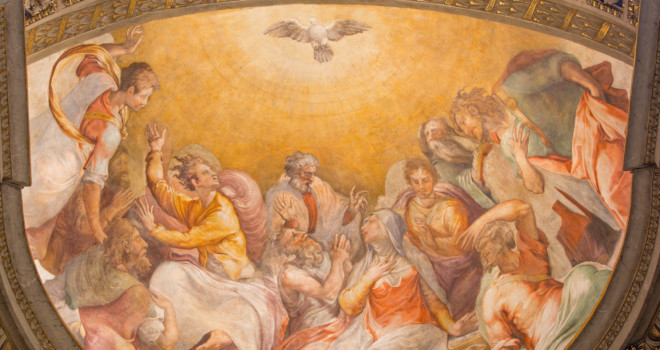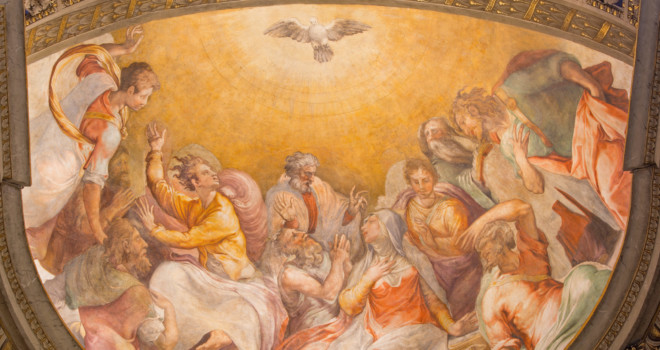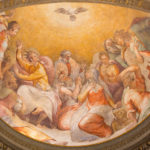Pentecost is one of the most ancient feasts of the Catholic Church, predating Christmas and perhaps emerging alongside Easter. It is first mentioned in a fragment of a lost work by St. Irenaeus, dating to the late second century.[1] He wrote that Christians omitted genuflecting during the Pentecost liturgy as a sign of its special significance. A few decades later, Tertullian mentioned the feast as something already well established and assumes his readers’ familiarity with it. In his treatise on baptism (probably written between 198 and 207) he suggests that, after Easter, Pentecost is the most fitting day upon which to celebrate baptisms.[2] It may thus be assumed that the feast had become a universal observation by the year 200 at the latest.
Since time immemorial, Pentecost has always been celebrated on a Sunday fifty days after Easter. Since Pentecost must fall on a Sunday, it is considered a movable feast—a solemnity, like Easter, that may fall on different dates of the year to keep it anchored to a particular Sunday. But why did the early Church decide that Pentecost must be a Sunday feast? After all, the Bible does not specifically say that Pentecost fell on a Sunday.
Despite the Bible’s silence on when Pentecost happened, there is good evidence to suppose that the original coming of the Holy Spirit in the Upper Room occurred on a Sunday. How can we know this?
First, we need to understand the Old Testament background of Pentecost. Pentecost was originally the Jewish Festival of Shavout, the biblical “Feast of Weeks.” Shavout literally means “weeks” (שָׁבוּעוֹת). The institution of the festival can be found in the Book of Exodus where its commemoration is ordained as a thanksgiving for the early summer wheat harvest: “You shall observe the festival of weeks, the first fruits of wheat harvest, and the festival of ingathering at the turn of the year” (Ex. 34:22). In ancient Israel the early grain harvest lasted seven weeks, beginning at Passover and terminating with the Festival of Weeks. It was considered a time of rejoicing.[3]
There were other meanings attached to the festival as well: it commemorated the giving of the Law on Mount Sinai. The Bible does not say when the Law was given, nor does it explicitly connect the Festival of Weeks with this event. This can be considered a rabbinical tradition. Another tradition of the Hellenistic era associated it with the annual renewal of the Noahic covenant with all mankind (Gen. 9:8-17).
In the Septuagint, the Greek translators used the word Πεντηκοστή (Pentēkostē) to refer to the festival.[4] The word Pentecost means “fiftieth” and obviously refers to Shavout as occurring on the fiftieth day—but the fiftieth day after what? The answer to that determined the date of Pentecost. In the first century there were two methods of reckoning the date of Shavout: that of the Sadducees and that of the Pharisees. The Sadducees reckoned Shavout as fifty days from the first weekly Sabbath of the Jewish New Year, which meant the Shavout was always celebrated on a Sunday, since starting on a Sabbath (Saturday) and adding fifty days would always result in a Sunday celebration.
The Pharisees, however, reckoned it as fifty days from the Passover Sabbath, which allowed flexibility for the day of the feast to move based on the timing of Passover, which, since it falls on the 14th of Nisan, may occur on any day of the week. Since the Sadducees controlled the Temple worship during the time of the Book of Acts, it is likely that Feast of Pentecost mentioned in Acts was celebrated on a Sunday according to the Sadducees’ reckoning.
However, even in the unlikely occurrence that the Pharisaic calendar was used, we know from the Gospels that the Pharisees celebrated Passover that year on a Friday night (which would have been the Saturday Sabbath in Jewish reckoning, as a new day began at sunset). This means the Pharisaic reckoning would have fixed Pentecost that year on a Sunday as well. Therefore, whether we assume the calendar of the Pharisees or the Sadducees, we can be fairly certain that the Pentecost mentioned in Acts 2:1 fell on a Sunday.
And thus has it been celebrated by the Church ever since.
Much of the content for this essay was taken from my book The Feasts of Christendom: History, Theology, and Customs of the Principal Feasts of the Catholic Church (Cruachan Hill Press, 2021). The Feasts of Christendom studies the origin, development, and observance of the great festivals of Christendom. It’s an excellent resource to get educated on an important part of our Catholic heritage.
[1] See the seventh fragment. These fragments were discovered in manuscript of Eusebius found in Turin and first published in 1715. Their authenticity is generally accepted but not without some dissent.
[2] Tertullian, De Baptismo, 17
[3] See Deut. 16:9–11, Isa. 9:2, Jer. 5:24
[4] These references are found in Tobit 2:1 and 2 Maccabees 12:32
✠
Image: ROME, ITALY – MARCH 27, 2015: The Pentecost fresco in church Santa Maria dell Anima by Francesco Salviati from 16. cent. Shutterstock/Renata Sedmakova












